| 27 August |
• yesterday • tomorrow |
| Memorial of Saint Monica |
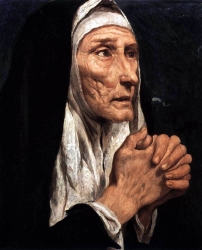
Raised in a Christian family, she was given in marriage to a bad-tempered, adulterous pagan named Patricius. Mother of two, one of whom is Saint Augustine of Hippo whose writings about her are the primary source of our information about Monica. She prayed constantly for the conversion of her husband (who converted on his death bed), and of her son (who converted after a wild life). Spiritual student of Saint Ambrose of Milan. Reformed alcoholic.
322 at Tagaste (Souk Ahrus), Roman North Africa (modern Algeria)
387 at Ostia, Italy
• alcoholics, alcoholism
• difficult marriages
• disappointing children
• homemakers, housewives
• married women, wives
• mothers
• victims of adultery or unfaithfulness
• victims of verbal abuse
• widows
• Archconfraternity of Christian Mothers
• Bevilacqua, Italy
• Mabini, Bohol, Philippines
• cincture, girdle
• tears
Nothing is far from God. - Saint Monica
Son, nothing in this world now affords me delight. I do not know what there is now for me to do or why I am still here, all my hopes in this world being now fulfilled. - Saint Monica, about the conversion of Augustine
The day was now approaching when my mother Monica would depart from this life; you know that day, Lord, though we did not. She and I happened to be standing by ourselves at a window that overlooked the garden in the courtyard of the house. At the time we were in Ostia on the Tiber. And so the two of us, all alone, were enjoying a very pleasant conversation, "forgetting the past and pushing on to what is ahead.." We were asking one another in the presence of the Truth - for you are the Truth - what it would be like to share the eternal life enjoyed by the saints, which "eye has not seen, nor ear heard, which has not even entered into the heart of man." We desired with all our hearts to drink from the streams of your heavenly fountain, the fountain of life. That was the substance of our talk, though not the exact words. But you know, O Lord, that in the course of our conversation that day, the world and its pleasures lost all their attraction for us. My mother said, "Son, as far as I am concerned, nothing in this life now gives me any pleasure. I do not know why I am still here, since I have no further hopes in this world. I did have one reason for wanting to live a little longer: to see you become a Catholic Christian before I died. God has lavished his gifts on me in that respect, for I know that you have even renounced earthly happiness to be his servant. So what am I doing here?" I do not really remember how I answered her. Shortly, within five days or thereabouts, she fell sick with a fever. Then one day during the course of her illness she became unconscious and for a while she was unaware of her surroundings. My brother and I rushed to her side, but she regained consciousness quickly. She looked at us as we stood there and asked in a puzzled voice: "Where was I?" We were overwhelmed with grief, but she held her gave steadily upon us, and spoke further: "Here you shall bury your mother." I remained silent as I held back my tears. However, my brother haltingly expressed his hope that she might not die in a strange country but in her own land, since her end would be happier there. When she heard this, her face was filled with anxiety, and she reproached him with a glance because he had entertained such earthly thoughts. Then she looked at me and spoke: "Look what he is saying." Thereupon she said to both of us, "Bury my body wherever you will; let not care of it cause you any concern. One thing only I ask you, that you remember me at the altar of the Lord wherever you may be." Once our mother had expressed this desire as best she could, she fell silent as the pain of her illness increased. - from the Confessions of Saint Augustine
https://catholicsaints.info/saint-monica/
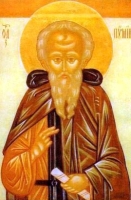
Pastor, Shepherd
Leader of a group of hermits in the desert of Skete in Egypt, living in the abandoned ruins of a pagan temple at Terenuth. Noted for his strong discipline, permitting himself and his brothers four hours of sleep a day, spending the rest of the time in chores, prayers or study. One of the very few survivors of barbarian raids in 407. Urged frequent Communion for all; had a way with words and was known for his wise sayings.
c.450 of natural causes
The beginning of evil is the lack of vigilance. - Saint Poemen
Silence is not a virtue when charity calls for speech. - Saint Poemen
A living faith consists of thinking little of self, and showing consideration for others. - Saint Poemen
Teach your heart to guard that which your tongue teaches. - Saint Poemen
When your brother attacks you, whatever the insults are, if you get angry at him, you are getting angry without cause. Even if he were to pull out your right eye, and to cut off your right hand, if you get angry at him, you are getting angry without cause. Yet if he were to try to take you away from God, then get angry! - Saint Poemen
Do not lay open your conscience to anyone whom you do not trust in your heart. - Saint Poemen
To instruct your neighbour is the same thing as reproving him. - Saint Poemen
If you take little account of yourself, you will have peace, wherever you live. - Saint Poemen
To throw yourself before God, not to measure your progress, to leave behind all self-will; these are the instruments for the work of the soul. - Saint Poemen
Let go of a small part of your righteousness and in a few days you will be at peace. - Saint Poemen
To throw yourself before God, to not measure your progress, to leave behind all self-will - these are the instruments for the work of the soul. - Saint Poemen
You must flee from sensual things. Verily, every time a man comes close to a struggle with sensuality, he is like a man standing at the edge of a deep lake, and the Enemy throws him in whenever he likes. But if the man lives far from sensual things, he is like one who stands at a distance from the lake, so that even if the Enemy entices him in order to throw him to the bottom, God sends him help at the very moment that the Enemy is drawing him away and doing him violence. - Saint Poemen
Give not your heart to that which does not satisfy your heart. - Saint Poemen
If you are silent, you will possess peace wherever you live. - Saint Poemen
The nature of water is soft, and the nature of stone is hard; but if a bottle is hung above the stone, allowing the water to fall down drop by drop, it wears away the stone. So it is with the Word of God: it is soft and our heart is hard, but the man who hears the Word of God often opens his heart to the fear of God. - Saint Poemen
https://catholicsaints.info/saint-poemen/
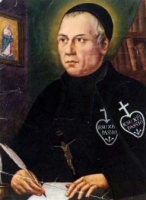
• Dominic of the Mother of God
• Apostle to England
Born to a poor farm family, orphaned by age eight, and raised by an aunt and uncle on a farm in Merlano, Italy. An uneducated shepherd boy, he spent his time with the flocks in prayer. Met many Passionist priests exiled from France during the repressions of Napoleon. During prayers with them he received a divine message that he would work in northern Europe and England. One day in 1814, just before he entered into an arranged marriage, he slipped away from his family and joined the Passionists, taking the name Dominic of the Mother of God.
Though he had no education, Dominic proved to be an excellent student, quick to grasp philosophy and theology. Ordained in Rome on 1 March 1821. Teacher and spiritual director, writer on theology and homiletics. One of his works was based on the idea of bringing modern science to philosphical studies; condemned in its day, it's now seen as preparing the way for some of the reforms of Pope Leo XIII. Feeling always drawn to England, he worked to learn English, and met with any English visitors to Rome that he could find.
Delegate to the general chapter of his Order in 1833. With Father Peter Magagnotto, Father Seraphim Giammaria, and Brother Crispin Cotta, he established the first Passionist presence at Ere, Belgium in 1840, the first Passionist monastery outside Italy. Dominic, however, continued to press the need for work in England, and he was finally assigned to work there, establishing the first residence during Holy Week of 1842. Tireless preacher and home missioner, working for the return of anti-Catholic England to unity with Rome. Received many to the faith including John Henry Cardinal Newman's conversion to Catholicism and Father George Spencer's entrance to the Passionists; both their Causes for beatification are being investigated.
22 June 1792 at Viterbo, Italy
• 3pm 27 August 1849 at Reading, Berkshire, England of a heart attack
• buried in the Passionist church in Saint Helen's, Lancashire, England
27 October 1963 by Pope Paul VI at Rome, Italy
O God, who so lovingly raised Blessed Dominic to the heights of holiness, learning and apostolic zeal and made him a powerful minister of Thy mercy for the return of many of our separated brethren to the Catholic Church, grant to us here below, an abundant share of his virtues and deign, through his intercession, to grant us this particular grace. May we too, according to our state, contribute to the realisation of his desire for the union of all Christians in the one True Fold under the one Shepherd, Amen. - novena prayer to Blessed Dominic Barberi CP, Apostle of England
https://catholicsaints.info/blessed-dominic-barberi/
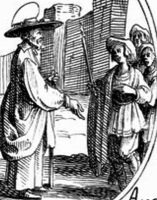
Brother of Saint Caesaria of Arles. Entered the monastery at Lérins at age 18, and worked as his house's cellarer. His devotion to duty earned him the enmity of some of his brother monks who were too interested in the house wines. Illness forced him to leave the monastery, and while he recovered in Arles, his uncle Eonus, bishop of Arles, had him transferred from Lérins.
Priest. Spent three years reforming a monastery that had lost discipline. Reluctant bishop of Arles in 503; he would rule his see for 40 years. Noted reformer and opponent of Arianism in his see, he presided over several synods where he insisted on discipline and orthodox teaching. He regularly visited his parishes, and was a successful preacher; several of his sermons have survived to today. He ordered that the Divine Office be sung every day in his churches. Built a convent in Arles with his sister as abbess, and wrote a rule for its nuns. His work restored confidence his clergy, and brought many back to the faith. Spiritual teacher of Saint Cyprian, whom he consecrated as bishop.
In 505 he was exiled to Bordeaux by King Alaric II of the Visigoths who was under the mistaken impression that Caesarius was trying to make Arles part of Burgundy. When the accusation was disproved, Caesarius was allowed to return to his diocese. There he helped the victims of the seige of Arles by the forces of Burgundy. He was arrested for political reasons when Theodoric the Ostrogoth seized Arles, but the charges were dropped and Caesarius freed in 513.
Pilgrim to Rome, Italy. Apostolic delegate to Gaul, receiving the pallium from Pope Saint Symmachus, repeatedly the first time a western bishop was so honoured. Attended the Council of Orange in 529, and led the movement to condemn Semi-pelagianism. Published Brevarium Alarici, an adaptation of Roman law; it became the civil law of all Gaul. Following the fall of Arles by the Franks in 536, Caesarius moved his offices and residence to Saint John's convent where he lived out his last seven years, spending much of his time in prayer.
• 470 at Châlons, Burgundy, Gaul (modern France)
• Roman citizen
27 August 543 at Saint John's convent, Arles, Gaul (modern France)
against fire
• bishop with crozier and papal pallium
• sword stuck through a book
• glove on a book
• bishop tending to sick people
• bishop distributing alms to the poor
• bishop saving monks from a burning monastery
https://catholicsaints.info/saint-caesarius-of-arles/

• Guarinus of Molesmes
• Guarinus of Sitten
• Guarinus of Zion
• Guarin, Guarino, Guerin, Guerrino, Warin, Warinus
• 14 February (Foglianti d'Italia since 1701)
• 30 August (diocese of Sion, Switzerland; Trappists; Cistercians)
• 1 September (Geneva, Switzerland and Annecy, France since 1777)
Born to the nobility. Cistercian Benedictine monk at the monastery of Molesmes in Laignes, Côte-d'Or, Burgundy, France. Spiritual student of Saint Robert of Molesmes. Helped found the monastery of Aulps in the Savoy region, diocese of Geneva, Switzerland, and was chosen its second abbot in 1113. In 1120, in order to ensure the house stayed true to its founding principles, he had it moved from the jurisidction of Molesmes and to that of Clairvaux. Guerrino served as abbot for 37 years during which worked endless for the growth of the abbey and the spiritual development of its monks. In 1138 Guerrino agreed to the requests of Pope Innocent II and became bishop of Sion, Switzerland. Though he had accepted the see reluctantly, he was known for his zeal in spreading and supporting the faith in his diocese, and improving its administration.
c.1065 at Pont-à-Mousson, Lorraine (in modern France)
• 27 August 1150 in the Aulps monastery in Savoy (in modern France) of natural causes
• relics hidden in 1794 to save them from the anti–Christian excesses of the French Revolution
• relics enshrined in the church of the parish of Saint John of the Aulps in 1804
• relics moved to the church of Plan d'Avau in Saint-Jean-d'Aulps, Switzerland in 1886
• some relics enshrined in Jeuxey, Vosges, France in 1873
• against plague
• cattle
https://catholicsaints.info/saint-guarinus-of-sion/
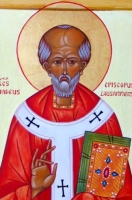
Amadeus von Lausanne
30 August (Diocese of Lausanne-Geneva-Fribourg)
Son of Blessed Amadeus of Clermont. Member of the royal family of Franconia. Educated at the monasteries at Bonnevaux and Cluny in France. Courtier in the household of King Henry V of Savoy and Burgundy. Cistercian monk at Clairvaux Abbey in 1124 under the direction of Saint Bernard of Clairvaux. Abbot of Ilautecombe abbey, Savoy in 1139. Though he protested his inadequacy, he was chosen bishop of Lausanne, Switzerland in 1144. He worked for reform in the violent, disturbed diocese, both in the clergy and laity. Co-regent for and teacher of Duke Blessed Humbert of Savoy. Chancellor of Burgundy, appointed by Frederick Barbarossa. Several of his homilies have survived to today.
1110 in the castle of Chatte, Dauphine, France
• 27 August 1159 of natural causes
• interred in the cathedral of Lausanne, Switzerland
• tomb and relics rediscovered in the cathedral in 1911
• 1710 (public cultus began)
• 9 December 1903 by Pope Pius X (cultus confirmed)
Cistercian bishop receiving a pair of gloves from the Blessed Virgin
For she was full of grace and blessed among women. She alone merited to conceive the true God of true God, whom as a virgin, she brought forth, to whom as a virgin she gave milk, fondling him in her lap, and in all things she waited upon him with loving care. - Amadeus of Lausanne, De Beatae Virginis Obitu, Assumptione in Caelum Exaltatione ad Filii Dexteram
https://catholicsaints.info/blessed-amadeus-of-lausanne/
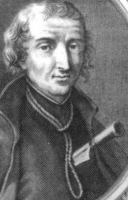
Charles Baker (alias used to hide from anti-Catholic authorities in Wales)
25 October as one of the Forty Martyrs of England and Wales
His mother, Margaret Prichard, was Catholic, but his father, Morgan Lewis, was a Protestant school headmaster; David, the youngest of nine children, was raised Protestant. He was reconciled to Catholicism in Paris, France at age 16. Studied at the English College in Rome, Italy from 1638. Ordained in 1642. Joined the Jesuits in 1645. Spiritual director of the English College in Rome. He returned to Wales in 1648 and spent over 30 years ministering to persecuted Catholics from the village of Cym, living in a farmhouse that served as a base for missionary work. During the increased persecutions triggered by the Titus Oates Plot, David was betrayed by a servant, and arrested in November 1678 at Llantarnan, Wales. Condemned in March 1679 for the crimes of being a priest and saying Mass. Imprisoned and interrogated in London, then returned to Usk. One of the Forty Martyrs of England and Wales.
1616 in Abergavenny, Monmouthshire, Wales
• hanged, drawn and quartered on 22 August 1679 in Usk, Monmouthshire, Wales
• buried in Usk
• his grave has become a pilgrimage destination
25 October 1970 by Pope Paul VI
Sweet Jesus, receive my soul. - Saint David's last words
https://catholicsaints.info/saint-david-lewis/
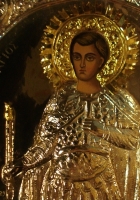
Fanourios, Fanurius, Phanurios, Phanourios
Soldier. Martyr. No other reliable information has survived. An apparition of Phanurius was reported on the island of Rhodes in 1500. Tradition says that he died praying for his mother; she was such a notorious sinner that he became known as patron of lost or impossible causes.
at Crete
stoned to death
• lost articles
• desperate, forgotten, impossible or lost causes
• soldier in armour holding a spear
• soldier in armour holding a cross with a lit candle on the top
• soldier holding a cross in one hand, a lit candle in the other
A heavenly song of praise is brightly sung on the earth; the hosts of the Angels keep an earthly festival now in splendour and radiant joy; from on high, they praise with hymns thy suff'rings and struggles; and below, the Church doth laud the heavenly glory thou foundest by thy contests and pains, O glorious Phanurius. - Dismissal Hymn of the Martyr
https://catholicsaints.info/saint-phanurius/
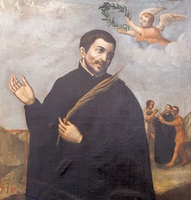
• 29 October as one of the Martyrs of Douai
• 22 November as one of the Martyrs of England, Scotland, and Wales
Studied at Rheims, France in 1591, and at English College in Valladolid, Spain in 1592. Ordained at Valladolid in 1593. An exceptional student of Greek. Returned to England in 1594 to minister to covert Catholics in the area of Herefordshire for 16 years during a period of official persecution. Arrested on Easter, 1610, and executed for the crime of being a priest. Martyr.
1566 at Stratton Sugwas, Herefordshire, England
hanged, drawn, and quartered on 27 August 1610 at Leominster, Herefordshire, England
22 November 1987 by Pope John Paul II
https://catholicsaints.info/blessed-roger-cadwallador/
After studying at the San Indalecio de Almería seminary, Juan was ordained a priest in the diocese of Almería, Spain on 4 June 1909. Parish priest for 25+ years. Chaplain of the Little Sisters of the Poor and of the Provincial Prison of Almería in 1935. Imprisoned and martyred in the Spanish Civil War.
20 November 1882 in Rioja, Almería, Spain
27 August 1936 aboard the battleship Jaime I anchored in the harbor in Almería, Spain
• 25 March 2017 by Pope Francis
• beatification celebrated in the Palacio de Exposiciones y Congresos de Aguadulce, Almería, Spain, presided by Cardinal Angelo Amato
https://catholicsaints.info/blessed-juan-sanchez-molina/
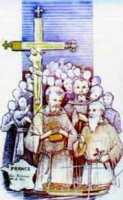
Priest in the diocese of La Rochelle, France. Imprisoned on a ship in the harbor of Rochefort, France and left to die during the anti-Catholic persecutions of the French Revolution. Appointed by his bishop to serve as vicar-general of the prisoners, he tended to them as best he could in the horrible conditions of the ships. One of the Martyrs of the Hulks of Rochefort.
24 March 1732 in La Rochelle, Charente-Maritime, France
27 August 1794 aboard the prison ship Deux-Associés, in Rochefort, Charente-Maritime, France
1 October 1995 by Pope John Paul II
https://catholicsaints.info/blessed-jean-baptiste-souzy/
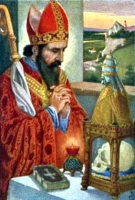
Gebhard II
Bishop of Constance (Konstantz), Germany from 979 till his death. Founded the Benedictine abbey of Peterhausen in 983.
949 in Austria
• 27 August 995 of natural causes
• buried at Peterhausen abbey in Switzerland
• Constance, Germany, city of
• Vorarlberg, Austria, province of
• bishop reaching his staff to a lame man
• bishop with a skull wearing a papal tiara near him or on a book
• bishop with the Blessed Virgin Mary appearing to him
https://catholicsaints.info/saint-gebhard-of-constance/
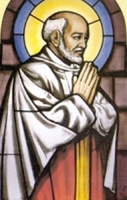
• Angelo Conti
• Angelo of Foligno
• Angelus Conti
Born to the Italian nobility. Augustinian hermit at the age of 20. Friend of Saint Nicholas of Tolentino and Saint Hugolinus of Gualdo Cattaneo. Helped found three Augustinian monasteries.
• 1226 in Foligno, Umbria, Italy
• relics enshrined in the church of Saint Augustine, Foligno
26 or 27 August 1312 in Foligno, Umbria, Italy
11 March 1891 by Pope Leo XIII (cultus confirmation)
https://catholicsaints.info/blessed-angelus-of-foligno/

Brother Uldaric
Salesian brother, joining on 16 October 1785. Imprisoned on a ship in the harbor of Rochefort, France and left to die during the anti-Catholic persecutions of the French Revolution. One of the Martyrs of the Hulks of Rochefort.
1 February 1755 in Fraisans, Doubs, France
27 August 1794 aboard the prison ship Deux-Associés, in Rochefort, Charente-Maritime, France
1 October 1995 by Pope John Paul II
https://catholicsaints.info/blessed-jean-baptiste-guillaume/

Licerio, Lizier
Spiritual student of Saint Faustus of Riez in France. Bishop of Couserans, France in 506. Saved the city of Courserans from Visigoth destruction by prayer.
500 in Lleida in the Pyrenees (in modern Spain)
c.548 in Courserans, Aquitaine (in modern France) of natural causes
https://catholicsaints.info/saint-licerius-of-couserans/
Bacolo, Baccolo
Born to the nobility, he gave up the worldly life to devote his life to study and prayer. Bishop of Sorrento, Italy. Noted for his work to end paganism in his diocese, and as an exorcist.
• 27 August c.660
• interred in the walls of Sorrento, Italy
• re-interred in the church of San Felice in Sorrento
Sorento, Italy
https://catholicsaints.info/saint-baculus-of-sorrento/
Gilbert Nicolas
Refused admission by several houses of the Franciscan Observants before being received at Notre Dame de la Fon, Rochelle, France. Priest. Confessor to Saint Jane of Valois. Worked with Saint Jane to found the order of the Annonciades in 1532.
1463 at Clermont, France as Gilbert Nicolas
1532
1647 by Pope Innocent X (cultus confirmed)
https://catholicsaints.info/blessed-gabriel-mary/

Founded the Missionary Work of Jesus and Mary.
27 July 1906 in Zaragoza, Spain
27 August 1945 in San Sebastian, Guipúzcoa, Spain of natural causes
4 November 2001 by Pope John Paul II
https://catholicsaints.info/blessed-maria-pilar-izquierdo-albero/
Narno
15 January (diocese of Bergamo, Italy)
First bishop of Bergamo, Italy.
• c.345 in Bergamo, Italy of natural causes
• interred in the crypt of the church of Saint Alexandria, Bergamo
• relics transferred to the modern cathedral of Saint Alexander in 1561
https://catholicsaints.info/saint-narnus-of-bergamo/
Orontius
1 September as one of the Twelve Holy Brothers
Martyred in the persecutions of Maximian.
• beheaded in 303 at Potenza, Italy
• relics enshrined in the Basilicata of Pontenza
• relics enshrined in Benevento, Italy in 760
https://catholicsaints.info/saint-arontius-of-potenza/
1 September as one of the Twelve Holy Brothers
Martyred in the persecutions of Maximian.
• beheaded in 303 at Potenza, Italy
• relics enshrined in the Basilicata of Pontenza
• relics enshrined in Benevento, Italy in 760
https://catholicsaints.info/saint-fortunatus-of-potenza/
1 September as one of the Twelve Holy Brothers
Martyred in the persecutions of Maximian.
• beheaded in 303 at Potenza, Italy
• relics enshrined in the Basilicata of Pontenza
• relics enshrined in Benevento, Italy in 760
https://catholicsaints.info/saint-honoratus-of-potenza/
1 September as one of the Twelve Holy Brothers
Martyred in the persecutions of Maximian.
• beheaded in 303 at Potenza, Italy
• relics enshrined in the Basilicata of Pontenza
• relics enshrined in Benevento, Italy in 760
https://catholicsaints.info/saint-sabinian-of-potenza/

Rufino, Rufo
Spiritual student of Saint Apollinaris of Ravenna. Bishop of Capua, Italy. Martyred in the persecutions of Diocletian.
295
https://catholicsaints.info/saint-rufus-of-capua/
Monk of Saint-Pierre-le-Vif Abbey in Sens, France. Bishop of Sens. Held his flock together and helped them survive a siege by Saracens in 725.
Tonnere, France
740
https://catholicsaints.info/saint-ebbo-of-sens/
Convert. Nun. Murdered by her own brother during the persecutions of Decius. Martyr.
Sicily, Italy
3rd century Leontini, Sicily
https://catholicsaints.info/saint-euthalia-of-leontini/
Dagan
Hermit in Somerset, England in an area that is now named Saint Decumans in his honour. Martyr.
Wales
706 in Saint Decumans, Somerset, England
https://catholicsaints.info/saint-decuman/
Monk at Saint Aper Abbey in Toul, France. Reforming abbot at Saint Bertin Abbey in Sithin, France where he worked to restore monastic discipline.
957
https://catholicsaints.info/saint-agilo-of-sithin/
Martyr.
Persian
sewn up in a sack and drowned in a well in Persia
https://catholicsaints.info/saint-anthusa-the-younger/
Hermit in Merns, Kincardineshire, Scotland. Martyred by Norwegian invaders.
c.1040
https://catholicsaints.info/saint-malrubius-of-merns/
Bishop of Pavia, Lombardy, Italy from 801 to 813.
813 of natural causes
https://catholicsaints.info/saint-giovanni-of-pavia/
Carpone
Martyred in the persecutions of Diocletian.
295
https://catholicsaints.info/saint-carpophorus-2/
Alermius
Bishop of Lyons, France.
602
https://catholicsaints.info/saint-etherius-of-lyons/
• Martyrs of Mesia
• Martyrs of Oxyrynchus
• Martyrs of Tomis
A group of 17 Christians imprisoned and excuted for their faith during the persecutions of Diocletian. They miraculously were unburned by fire and untouched by wild animals. We know the names and a few details on five of them - John, Mannea, Marcellinus, Peter and Serapion.
• tied to stakes and burned alive; they emerged unharmed
• thrown to wild animals in the amphitheatre; the animals ignored them
• beheaded in 304 in Tomi, Mesia (modern Costanza, Romania)
Are you not ashamed to honor a man put to death and buried hundreds of years ago by order of Pontius Pilate - the governor of Tomi to the martyrs; they ignored him
https://catholicsaints.info/martyrs-of-tomi-27-august/
Thousands of people were murdered in the anti-Catholic persecutions of the Spanish Civil War from 1934 to 1939. I have pages on each of them, but in most cases I have only found very minimal information. They are available on the CatholicSaints.Info site through these links:
• Blessed Buenaventura Gabika-Etxebarria Gerrikabeitia
• Blessed Esteban Barrenechea Arriaga
• Blessed Fernando González Añon
• Blessed Francisco Euba Gorroño
• Blessed Hermenegildo Iza Aregita
• Blessed José María López Carrillo
• Blessed Juan Antonio Salútregui Iribarren
• Blessed Pedro Ibáñez Alonso
• Blessed Pelayo José Granado Prieto
• Blessed Plácido Camino Fernández
• Blessed Quirino Díez del Blanco
• Blessed Ramón Martí Soriano
A group of fourteen missionaries and Japanese native Christians who were martyred together for their faith -
• Blessed Antonius of Saint Francis
• Blessed Bartolomé Díaz Laurel
• Blessed Caius Akashi Jiemon
• Blessed Francisca Pinzokere
• Blessed Francisco of Saint Mary
• Blessed Franciscus Kuhyoe
• Blessed Leo Kurobyoe Nakamura
• Blessed Lucas Tsuji Kyuemon
• Blessed Ludovicus Matsuo Soyemon
• Blessed Magdalena Kiyota
• Blessed Maria Shobyoe
• Blessed Michaël Koga Kizayemon
• Blessed Thomas Sato Shin'emon
• Blessed Tsuji Shobyoe
16 August 1627 in Nagasaki, Japan
7 May 1867 Pope Pius IX
https://catholicsaints.info/martyrs-of-nagasaki-27-august/
• Luis Suarez
CatholicSaints.Info Portable Edition